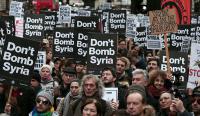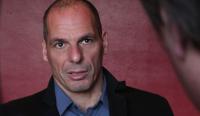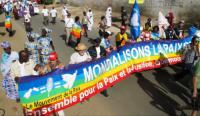Even before the Occupy movements started in the U.S. or Spain in 2008 the Balkans witnessed a revival of direct democracy experiments. From Slovenia and Serbia to Macedonia and Bosnia grassroots protests, plena and resistance against government policies involved thousands of people. Even occupations of factories occured which led to the self-management of firms for example in Tuzla. In Belgrade people have resisted against the modernization of the port district where investors from the Arab Emirates want to build a “new Dubai” with two billion dollars. Protest movements have spread all over the place, says Horvat. This should be an inspiration for Europe and steer the continent away from its cynical course especially regarding refugees. The EU's walling-off refugees would be hypocritical. “It’s like putting a hand in front of our eyes and not looking at what Europe did with the war in Libya, with the French intervention for instance, with the war in Syria.”
Srećko Horvat: co-founder of DiEM25, philosopher, activist und author from Croatia
David Goessmann: Since the outbreak of the financial crisis in 2008, there have been occurred a series of anti-government protests in the Balkans, in Croatia, Slovenia, Bosnia, or Bulgaria. In Macedonia students mobilized successfully against a restrictive education reform. That morphed into an anti-government movement. There was also resistance against privatization and commercialization of higher education in Croatia and experiments with direct democracy in Bosnia. Workers strikes, takeovers of companies, and so on and so forth have also been invigorated in some places in the Balkans. Talk about these protests and what is behind them.
Srećko Horvat: It’s very interesting, because not so many people know that in the Balkans we had plenums, general assemblies, direct democracy, even before the Occupy Wall Street movement originally started. And I think it has to do with the legacy we had in Yugoslavia, where we had self-management, for instance, and where we had direct democracy to a certain degree. Of course it failed as a consequence of internal contradictions in the Yugoslav self-management system, but we had this legacy. So in order to understand these movements, and you named just a few of them, but all over the Balkans, from Slovenia to Macedonia to Serbia to Bosnia, you had direct democracy movements, you had occupations of factories, you have renewed self-management of factories, in Tuzla for instance, which still works today, which is a self-managed company by workers. At the same time, it was in Bosnia, where you had plenums in which more than 1,000 citizens gathered and protested against the government. Recently, most recently – it still takes place and it is one of the most interesting movements in the Balkans today – you have a movement which is called Ne da(vi)mo Beograd, which is a movement against the so-called Belgrade Waterfront, so what is happening now in Belgrade is that the United Arab Emirates invested, I think, more than 2 billion Euros or something like that. It’s so much that I cannot even repeat it because it’s completely abstract. So they want to build a new Dubai in the center of Belgrade with skyscrapers, shopping centers, and so on. And of course there are dodgy deals with the Serbian Vucic government. So what you had in the last year, 2016, and which will probably continue, is a movement which is able to bring 20,000 people on the streets. Of course one problem of all these movements is, and it’s not a particular Balkan problem, it’s a European, global problem is, what to do the day after. Because, today it’s not enough anymore to just protest on the streets against the government and then you get another government and then another government and so. I think what is interesting in the Balkans is that there is a transformation of some of these movements, so for instance in Slovenia, you had a big movement connected to the trade unions, where a new political party, Združena levica, was formed out of the movement. Our comrades in Serbia are trying to achieve something similar now, for the next local elections in Serbia, where they are building a united front with workers, with freelance journalists, all of them lost their jobs in all of the Balkans because of the crisis, and they’re trying to create an independent bloc to run in the next elections. So what you can see in the Balkans is that the ideas of progressive politics are back and they are back already for the last ten years and they were back even before this movement started to flourish in Spain, in Greece, or in the US. Of course I don’t want to say this is more important because it was first, I’m just noticing it because it’s interesting. And even when I was, in 2011, at Zuccotti Park during the Occupy Wall Street, I have seen guidelines from the student occupation of Croatia in 2009, there in their independent library. So it’s interesting that you can see there are connections with other movements as well, so it’s not that this protest energy doesn’t exist anymore and it’s not that it’s not connected.
David Goessmann: Last question: What is your assessment of the EU’s Balkan policies, and what do you think about the refusal of France and Germany to accept people fleeing from the Balkan countries, especially Sinti and Roma from the Kosovo?
Srećko Horvat: Phew. That’s a very complicated question, but I can answer it generally. I think Western countries, and we have seen it now with the refugee crisis, but I would say it goes back to that refugee crisis as well, behave very cynically. And I think the most cynical thing is the differentiation between refugees, asylum seekers, and economic refugees. And I think what they are doing, it was the same with the Balkans, is that you have different historical sequences, which last four or five years, where some refugees are the good refugees and some refugees are the bad refugees. So now in Belgrade, where almost 2,000 people sleep in the conditions of minus 10 degrees at the main railway station, most of them are, you know from where, from Afghanistan, but I still remember five years ago the Afghanistan refugees were the good refugees. Today it’s the Syrians who are the good refugees, and you can probably imagine that in five years, the Syrians will be at another railway station somewhere in Kosovo or Macedonia because they are the bad refugees now. And then you come also back to this ideological construct of on the one hand asylum seeker and on the other hand economic refugees, which I think is a complete ideological construct, which has to be deconstructed, because what does it mean? It says that Syrian refugees are correct, good refugees because they are asylum seeker because they are fleeing war, and at the same time, Afghanistan refugees are economic refugees. Come on! We don’t remember anymore that the crisis in Afghanistan happened because of Western interventions? That most of the countries of Africa are in the state that people from Sudan, from Congo, Eritrea, have to flee because of decades of economic warfare, because of centuries of colonization, and to say, from our European perspective, that these refugees are economic refugees, and that they are not good refugees, and that they cannot get asylum, is not only cynical, but it’s, you know, putting a hand in front of our eyes and not looking at what Europe did with the war in Libya, with the French intervention for instance, with the war in Syria, but we could also go back to what the Belgians did in Congo and I think all this has to – Why do you have people from Congo living in Europe? It goes back to the crisis and the colonial period in Congo where more than 10 million people were killed. And to come back to the Balkans, I think, the same goes for the Balkans. I mean, if you have mass unemployment in the Balkans today and you say, yes, these are economic refugees you have to go back and see why this economic situation was created in the first place and it again has to do with extractivism, neocolonialism and the financial crisis, which was in a way a consequence of this as well.
David Goessmann: Thanks a lot for the interview.
Srećko Horvat: Thank you.





